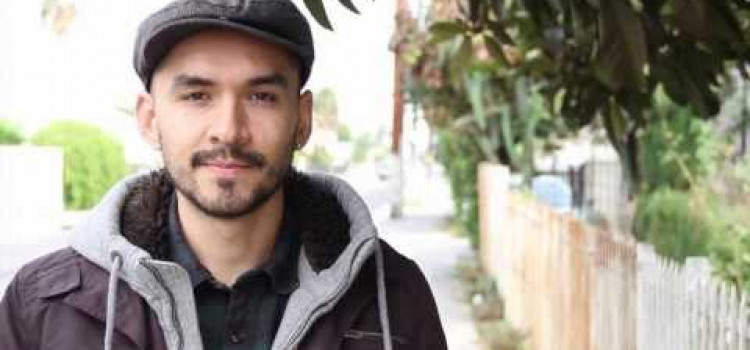

Since President Obama established the Deferred Action for Childhood Arrivals (DACA) program in August 2012, more than 400,000 young people have received DACA benefits. For many, DACA brought welcome relief to the constant stress, anxiety and fear that often came with a life without papers. VoiceWaves interviewed four “DACAmented” youth to explore the many different ways DACA has changed the way they live their lives and the hopes they have for a better future.
 Ana Roman, 25
Ana Roman, 25
Cashier at local cleaners
Studying Psychology, Chicano Studies & Africana Studies at CSULB
Ana Roman spent a late November weekend driving from her Long Beach home 45 miles east to Claremont for a conference for immigrant youth.
That long trek was huge for Roman. Before she was approved for DACA, she had to undergo two impoundments of her car, for driving without a license.
Life before DACA was tough. Roman was denied and fired from multiple jobs for using false identification. To better her life, Roman decided to take a risk: to drive without a license to get to and from work and school. Then things took a costly turn.
Roman’s car was impounded. Twice. Car impoundments can end up costing undocumented immigrants hundreds of dollars, and sometimes even losing the car itself.
For Roman, her experience with impoundments led her to determine that she would never own another vehicle for six years. But now, Roman can rest assured that an impoundment won’t happen again—at least in the next two years—because DACA now affords her a driver’s license.
“It gives me the freedom to go anywhere I want… I don’t have to think about it twice,” Roman said.
Roman has lived in Long Beach since she and her mother came to the U.S. from Mexico City when she was 8 years old. Today, Roman advocates for other immigrant youth and calls on organizers to challenge themselves to push the immigrant rights movement further.
“Now we’re secure to go out. It’s time to speak up for our parents and families,” Roman said.
Roman’s dream career is to teach social justice law as a professor.
“Before DACA, I wasn’t so sure about what I was going to do with my degree,” she said. “That was pretty depressing at times.”
But now, she finally has a valid social security number so she will be able to put her degree to work.
“It’s nine numbers that give me freedom to give back, to do as much as I can to my fullest potential. That’s the best thing I’ve got from DACA,” said Roman.
 Maria Garcia, 30
Maria Garcia, 30
Cashier at Hole Mole
Attended Wilson and Reid High Schools
Garcia always considered herself a nervous person.
As an undocumented person living in the U.S., Garcia made a living babysitting and with help from her husband. Garcia recalled the panic she felt in situations where she thought her status might be discovered, such as in a job interview.
“I feel like I can’t breathe, I start sweating, my cheeks get hot, my head hurts,” she said.
The same panic arose when police neared her.
“Are they going to ask me for my papers?” she wondered. “They usually knock on my door all the time because of problems from my neighbor… With the police, it can be intimidating.”
In 1991, Garcia’s mother brought her to the states from Michoacan, Mexico when she was 8 years old, along with her younger brother.
As they crossed the desert, someone yelled out “La migra (the police)!” and the group scattered. Her mother grabbed her in haste, while an accompanying stranger grabbed her brother and went in another direction.
“We got separated and we didn’t know if we were going to see each other again,” said Garcia, who later reunited with her brother in the U.S.
But now that Garcia has DACA status she enjoys a long-awaited peace of mind.
“I have nothing to hide. It makes me feel more comfortable, more secure,” she said.
Garcia has used her status to apply to other jobs to help her husband with finances. But she doesn’t have any references to give potential employers because her babysitting jobs were all “under the table.”
“I didn’t get paid by checks,” she said. “I have nothing since I’ve been in this bubble.”
 Safir Wazed, 24
Safir Wazed, 24
Local Tutor
Studying Engineering at CSULB
While seventy-five percent of DACA applicants are from Mexico, a number of young immigrants from other nations also sought relief through DACA.
Safir Wazed, an engineering student at CSULB, was born in Bogra, Bangladesh. He came with his parents to Long Beach when he was 7 years old, and soon after he arrived, he found himself caught in the middle of a messy immigration case.
“I’m the most unusual DACA person you will meet,” he said.
Wazed came to the US because his father sought better opportunities for his family. Wazed’s father had been an entrepreneur in the nation’s capital, Dhaka. But after living and working in what he called a “corrupt business culture,” he decided he had had enough.
“My dad wanted a fresh start,” said Wazed.
Wazed was trying to restart his life as an engineer when he found out he had lost their immigration case. His work permit and license were revoked and was no longer able to put his engineering skills to use. He struggled to go between school and his job as a tutor.
“It was a pain. I had to ask friends for rides,” he said.
Two years passed without any sign of hope. But then DACA came. With his new status, Wazed now has the support he needs to move his life forward.
“Now I can get around. Now I can get a job,” said Wazed.
But DACA comes short of propelling Wazed’s dreams completely.
“It’s only one step and not the finish line because I can’t work for the defense companies,” he said. “I worked my ass off. I want the big bone.”
Some of these big bones are Boeing, NASA, and Northrup Grumman. As Wazed prepared to intern for these goliath companies, he read their application: “It says U.S. citizenship required… back to square one,” he said.
DACA beneficiaries must reapply for program eligibility every two years. But Wazed does not exactly have a backup plan in case DACA were to end. For now, he is hoping to utilize DACA to demonstrate his skills to various employers. He is hopeful they might sponsor his residency.
“It’s something I avoid thinking about,” said Wazed, who has seen his privileges revoked before. “It’s just stressful if you think about any of this.”
 Manny “Diaz”, 25
Manny “Diaz”, 25
Health Coach for Nonprofit
Studied Film and Electronic Media & Sociology at CSULB
Seven years is how long “Diaz” worked in retail with someone else’s social security number to payoff tuition at CSULB. He now has a valid work permit and has been working for a nonprofit since he got DACAmented last year.
Originally from Irapuato, Guanajuato, Diaz and his family came to the U.S. when he was 3. His parents wanted him to be raised with the education standards here in the states.
After graduating from CSULB with a degree in Film and minor in Sociology, Diaz was granted DACA status.
“It seems like everything is different. My whole identity has shifted,” he said.
Diaz now works as a health coach in the Bay Area, assisting area low-income and undocumented patients with chronic illness.
“I’m helping them get on track,” he said.
The success of his big move, he said, is thanks to DACA.
“Being able to drive is a complete godsend,” said Diaz, who has had his car impounded multiple times. “I looked more at my rearview mirror more than the front of the road whenever I drove, all the time just looking for cops,” he said.
That’s in contrast to life today with DACA status, working for a nonprofit, and driving with a license.
“I couldn’t tell you the euphoria,” he said. “Just to be able to say ‘Here officer, here’s my license or here’s my social security number to apply,’ that changes everything,” he said.
Now Diaz is looking to pursue his ideal career goal, to start a community nonprofit to empower youth of color. This of course depends on whether DACA stays intact.
“I want to use my experience with film and passion with film to do that and get kids interested in their own sense of wonder,” he said.
Despite the new privileges and the new hope for his career dream, there are still things that keep Diaz up at night.
Now he laments not being able to seize chances to build his career as his peers did in college.
“Getting DACA felt like I was time-travelling to being 17 again,” he explained. “I missed out on all that. I couldn’t do so many different things because I was undocumented, because I couldn’t legally do it…I have a lot of catching up to do.”
If you require DACA help, contact Long Beach Immigrant Rights Coalition at 562-204-6333 or email [email protected] for assistance.
That organization is also scheduling a free DACA Clinic January 18th, Saturday between 10am-2pm at St. Luke’s Church, 525 E. 7th St., Long Beach. Participants should call 562-204-6333 to make an appointment, though drop-ins are welcome.
Check out the DACA Application APP for your smartphone to help to see if you qualify for DACA, a list of attorneys, and support organizations.
